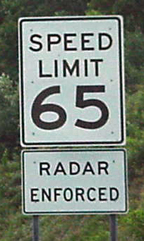Pedal to the metal, eye in the sky


So what?
I think there are two reasons they're using cameras and radar rather than conventional police cars. First, it's difficult for a police car to pursue speeders in the single (possibly crowded) lane that is typical of many work zones. And, second, when there's a $1,000 on the table, you don't want even a hint of human fallibility to enter the situation: You want the (ostensible) certainty of a radar-based camera system.
This technique gets interesting when states (or better yet, the federal government, which likely would welcome a chance to audit state enforcement of speeding laws) start using satellite-based detection. Put down two lines a mile apart and have the satellite track how long it takes each car to cross from one to the other. Military-grade satellites can supposedly already read license plates--I'm assuming (based on exhaustive research in which I rolled a 20-sided die until I got a number that looked about right) that civilian-grade technology will catch up in a decade or so. In fact, put down a line every mile along every stretch of highway within the jurisdiction and charge a fine for each line crossed above the limit. You could drive home and find 40 e-mails informing you that on your trip you had racked up 40 individual fines totaling appreciably more than your monthly rent. I like this solution because government can do it unilaterally: It doesn't require any broad technology rollout (such as RFID in every vehicle) and the civil liberties question has already been settled--US courts have ruled that you can have no expectation of privacy when you're in public. Happy trails.